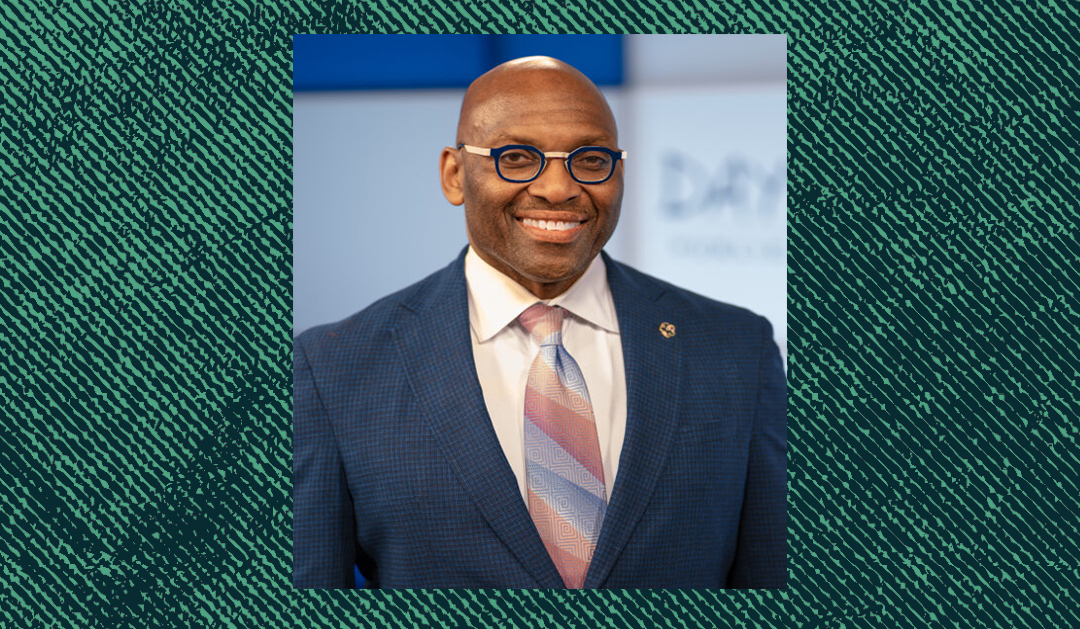“Two days ago, I made a decision to send 15,000 people home,” says David Lawrence. There was a tornado on the horizon, but still, calling off class for an entire school district was a hard decision to make. Lawrence, a graduate of the PhD in Leadership and Change program and the new superintendent of Dayton Ohio Public Schools, had to consider the impact on students, parents, and the staff that he now leads.
“It turned out to be 65 and sunny,” he says, shaking his head and laughing. “True story. But I made the decision because, in my mind, I was thinking about the people.”
It’s a funny example, but it’s also emblematic of the communal ethos Lawrence brings to all facets of his leadership. Lawrence identifies as being anti-capitalist, and this class consciousness drives both his day-to-day work and his long-term goals for the 12,000 students in his district. “I think about things from a collective sense, as communal,” he explains. “It is something I really believe in, that collectively people are always better than the individual.”
Centering the collective good is an ethos that Lawrence absorbed from his father and has developed throughout his career as an educator. It’s deeply felt—which is important because his perspective often challenges the status quo.
Education as the Foundation of Self Determination
While Monday through Friday, Lawrence is found rolling up his sleeves to manage the district, Saturdays are for dreaming. This is when he has the time to think about what he wants for the future of the district, getting his inspiration from a wide range of sources. He starts the day, from 6:00 AM to 8:00 AM, settling in to read.
Although “settling” may be the wrong word. “Sometimes I’ll get up, and I’ll go, ‘Okay, let me go into the ancient times and see what they’re saying about the world or education.’ Let me go to Haaretz, which is Israel; what are they saying there? Or let me go to France and see what they’re saying in their major newspaper? Or what are they saying in the Guardian in Great Britain,” he says.
Lawrence credits his expansive reading habits to his father. For 30 years, his dad worked at General Motors, assembling brake components for cars, never missing a day. Playing outside in the evening, Lawrence could see the light shining from the window as his dad turned page after page. “He would stay up all night reading these philosophers who were from the great enlightenment. And these revolutionaries from all these different places,” Lawrence recalls. “From Spain to France, to Cuba, to Haiti. I mean, he read about every single revolution the world had ever had.”
It’s this capacity for, and interest in, thinking critically that Lawrence wants for the students in his district. “We work in a society that’s very unequal,” he explains. “Part of my job is to try to create some space for the kids who are part of the working class, lower middle class, and are part of the masses, to be able to not only take care of themselves but have some of these critical thoughts.”
One side of success for Lawrence would be to see his students leave his district with career paths; another is that reading and travel open up their perspective of the world. Beyond passing tests or making a lot of money, “that’s the next frontier to me,” he says. “Most people I know, if they read a lot and travel a lot, it’s not as easy to bamboozle them. They’re usually pretty solid people.”
If there was more space for this in young people’s lives, Lawrence believes we would have a different political climate. As he says, “Without having critical theory as your educational foundation, you are like an empty vessel. People can open your head and pour anything in that they want.”
Foregrounding a Systemic Perspective to Advocate for Students
After teaching economics for ten years in the district, Lawrence became the assistant principal of his school for about eight months. “Then I was sent to, what at the time was, one of the most violent and worst performing high schools in the district, Thurgood Marshall High School,” he says. The school saw a dramatic turnaround during his tenure there. A story that’s well-known in the area. “Everybody talks about it,” he says. “You can actually go there now; there are no fights, and nobody’s in the hallway, and we have a great sports team. And they’re doing well academically.”
But the change that happened at Marshall didn’t happen because Lawrence was interested in statistics or test scores. When he started at the school and had his first meeting with staff, the focus was on the systemic realities their students were facing. He consistently pushes back on the idea that when there is an issue, it’s the students’ fault. “I’m a believer in this idea that being in education, in leadership, you have to be really, really progressive and liberal,” he explains. “Understanding that the conditions that you work in are not the fault of the individuals that you deal with.”
He saw how learning about power systems and systemic injustice can change white educators’ perspectives through his PhD work at Antioch. White teachers in suburban school districts were given three years of equity training. “What we found was that training on a regular basis profoundly changed how they thought,” Lawrence says. Teachers were no longer judging students or making assumptions based on their race, clothing, or other biased perceptions. “I’m convinced that if we consistently have training around equity for all educators, that their perspective on kids will change. And I think that changes their energy, effort, and outcomes,” Lawrence says.
At a recent meeting, he chatted with a former student from Thurgood interested in building a curriculum program with the school district. She works in the financial department of Wright Patterson Air Force Base, has an MBA, and owns several rental properties. She has the kind of financial independence that Lawrence knows can open up worlds for people. In her thirties, she still talked over lunch about the four years he was her principal.
“I often, as an educator, think about success not just in terms of what the state test scores say,” he says. “These types of qualitative stories suggest that I had some type of profound influence on lots of kids.” As superintendent, that profound influence will surely grow exponentially as he interacts with students, parents, and educators throughout the school district.
Connections Create Community in the District
Lawrence’s communal orientation often keeps him out of the office and in a place where it’s often rare to find a superintendent — in the actual schools he’s leading. Sometimes he can be found outside with second graders during recess or helping students get on the bus at the end of the day. “I’m in classrooms. I write notes to teachers. I have conversations with the security resource officers when we’re checking bags together,” he says, listing activities he takes part in during the school day. This is in addition to the emails, organizational planning, budgeting, and meetings the district requires to run.
Lawrence has the youthful energy that sometimes shines from teachers, it’s surprising when he says he’s sixty. But it’s not surprising that when he describes the work he does in schools that he has the latest language at his fingertips, “These are, as the kids say, verifiable facts. I’m verified,” he says.
Lawrence doesn’t see his position as above anyone else’s and the time he spends in the schools gives him insights he couldn’t get any other way. He wants to make sure he’s never asking someone to do work he would not do himself. “What I’m trying to convey is a sense of working-class norms that I want the whole organization to adhere to,” he explains.
Although his perspective goes beyond identity politics, Lawrence is also aware of the significance that out of the 615 school districts in Ohio, he is one of eight Black men who are superintendents. “It’s an incredible achievement that speaks to the forward-thinking of the school board and their ability to take a chance,” he explains. It would have been simpler to appoint someone with a more traditional vision rather than upsetting what Lawrence calls “the proverbial apple-cart.” “It’s a testament to them,” he says, “as a whole, that they were willing to say, ‘Okay, we really do want to see this get better for the kids and adults.”


